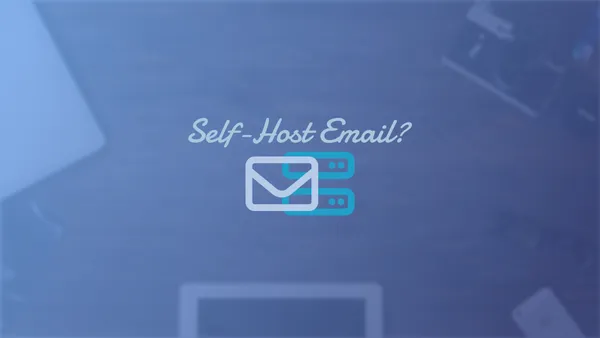The Introduction
Self-hosting email is the process of hosting your own email on your own hardware (or virtual private server). This is an alternative to using a third-party email provider such as Google, Microsoft, or Yahoo. The potential gains can give you greater control over your email system and the ability to customize it to meet your specific needs. It can also be more privacy-conscious, as you have full control over the data that is stored on your server.
To self-host email, you will need to set up a server that is configured to send and receive email. This can be done on a physical server or a virtual private server (VPS). There are several email server software options available, such as Postfix, Exim, and Dovecot, which you can use to manage your email system.
Self-hosting email can be a complex process and requires a certain level of technical expertise. You will need to handle tasks such as configuring DNS records, setting up security measures to protect against spam and other threats, and managing the server itself. If you are not comfortable with these tasks, you may want to consider using a managed email hosting service instead.
Self-Hosting Advantages
There are both advantages and disadvantages to self-hosting your own email server. Some of the potential advantages include:
- Greater control: When you self-host your own email server, you have full control over your email system and can customize it to meet your specific needs. You can choose the software and hardware that you use, and you have the freedom to make any changes that you see fit.
- Improved privacy: By hosting your own email server, you are in control of the data that is stored on it. This can be more privacy-conscious compared to using a third-party email provider, as you have full visibility into how your data is being used and can take steps to protect it.
- Cost savings: In some cases, self-hosting your own email server can be more cost-effective than using a managed email hosting service. This is especially true if you have a large number of users or need a high level of customization.
Self-Hosting Disadvantages
However, there are also some potential disadvantages to self-hosting your own email server, including:
- Complexity: Setting up and maintaining an email server can be a complex process that requires a certain level of technical expertise. You will need to handle tasks such as configuring DNS records, setting up security measures, and managing the server itself.
- Time and resource constraints: Self-hosting your own email server can be time-consuming and resource-intensive. You will need to devote the necessary time and resources to managing the server and ensuring that it is running smoothly.
- Limited support: When you self-host your own email server, you are responsible for providing your own support. This can be challenging if you run into technical issues or need help with troubleshooting.
- Reputation: You need a good IP reputation for email service. Google and Microsoft don't like emails that come from non-reputable sources. There is a long processing time to build your IP Reputation if you attempted this yourself. You can circumvent this by setting up a relay mail server through AWS, but it could be costly.
Overall, whether self-hosting your own email server is the right choice for you will depend on your specific needs and resources. If you have the necessary technical expertise and are willing to devote the time and resources to manage your own email server, it can be a good option. However, if you don't have the necessary technical skills or don't have the time and resources to devote to managing your own email server, it may be more practical to use a managed email hosting service.
Self-hosting your own email server carries some security risks compared to using a managed email hosting service. When you self-host your own email server, you are responsible for implementing and maintaining all of the security measures necessary to protect against threats such as spam, malware, and hackers. This can be a significant undertaking and requires a certain level of technical expertise.
In contrast, when you use a managed email hosting service, the provider typically handles the security of the server for you. This can be a more convenient and potentially more secure option, as the provider will have the necessary expertise and resources to implement and maintain robust security measures.
Privacy-Centric Alternatives
There are several alternatives to email hosting that prioritize privacy and encryption. Some of these services have calendars, drives, and VPN support/services attached to their brand as well. Most of these email-managed providers have Gmail-like touch and feel. These alternatives include:
- ProtonMail: ProtonMail is a secure email service that is based in Switzerland and is designed to protect users' privacy. It offers end-to-end encryption and does not track or log user data. They offer Contacts, Calendars, Drive, VPN, and more as services. Which also includes preventing email trackers.
- Hushmail: Hushmail is a secure email service that offers end-to-end encryption and does not track or store user data. It is based in Canada and is subject to Canadian privacy laws.
- Tutanota: Tutanota is a secure email service based in Germany that offers end-to-end encryption and does not track or store user data. It is designed to protect users' privacy and is subject to German privacy laws.
- FastMail: FastMail is a privacy-focused email service that is based in Australia and is subject to Australian privacy laws. It offers end-to-end encryption and does not track or store user data.
Self-Hosting Alternative
If you don't want to attempt to self-host and you don't like any of the mail providers, you could try your hand at another type of service. Microsoft 365 and Google G Suite are featured packed for both personal and commercial uses. ProtonMail has up-and-coming business-class services that are reasonably priced and could be seen as an alternative. All of these solutions could be costly so it would be wise to explore all options.
One option to consider is MXRoute. MXRoute is a low-cost and low-maintenance email hosting. Their plans are flexible and provide the bare necessities. I've been using MXRoute as my daily driver for quite some time, and sure I do miss some of the productivity options provided by Outlook and Google, however, I know I have a little more control over my data and not spending a fortune either for my entire family. They have a wide range of services. They can assist with email migration and domain registration. They have a webmail service or you can use their app. They also include spam protection.
My Use Case
I am using MXRoute, ProtonMail, and SimpleLogin. MXRoute is for the domains that I need to use IMAP email with. ProtonMail is my main email service and I use SimpleLogin to create and map aliases to categories of my choosing for better mail management. For me at least, it seems like Proton is catching the majority of the spam.
The Conclusion
That being said, it is important to note that both self-hosting your own email server and using a managed email hosting service carry some level of security risk. No system is completely immune to threats, and it is important to take steps to protect against potential vulnerabilities. However, these and other privacy-focused email services can provide additional protection for your data compared to using a mainstream email provider such as Google or Microsoft.
Full Disclosure
Most of this article is comprised of facts and opinions. The featured background image was created by andyoneru and is available on Unsplash. I added a blur and a gradient overlay with text to convey for this post.







